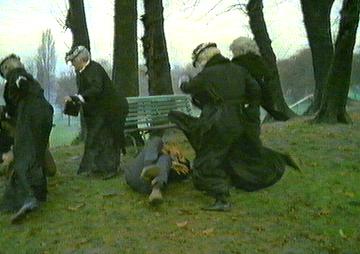Farkel:
Thank you for your spelling lesson. In fact the White House was not the only building that burned, all government buildings in Washington were also fired. The reason for this was that the flag of truce being carried by the British soldiers entering the city was fired upon.
As for the War of 1812 ensuring American independence, that is I understand how America claims a victory in this conflict. It is based upon a narrow view of the causes of the war, focussing mainly on the searching of US merchant vessels for British traitors by the British Navy, and supposed British aid to "the Indian menace", great exaggerated by Madison and the War Hawks.
What is usually downplayed by American accounts of the war are the other causes and the reality that the War of 1812 was a small part of the much greater conflict of the Napoleonic Wars.
Other causes included the damage to American trade caused by the trade embargos of both the British and the French. It should not be forgotten that Napoleon was the greatest dictator of the time, and yet America was perfectly willing to trade with him. Indeed the American government twisted and turned its way through The Embargo and Non-Intercourse Acts in futile and clumsy attempts to preserve its trade.
Another cause was more simple: the desire of the Hawks to annex more territory; the Southerners wanted Spanish Florida, the Northerners British North America. Hence the attempted invasions, quickly repelled, of future Canadian territory.
As to who "won" Mr. Madison's war, this is a fairly effective summary:
In the end we ask who won and who lost the War of 1812. The clear loser in this conflict without any doubt is the Native People of North America. In the summer of 1815, the United States signed fifteen treaties with the tribes, guaranteeing their status as of 1811. But it did not return an acre of land. The dream of the Indian state never came true.
If any one could claim victory it was Canada. The United States declared war on Great Britain and set out to make Canada states in the union. Ten American armies crossed into Canada and all were driven out.
There are even court martial charges laid against some of the American Generals after the SecondBattle of La Colle. Madison tried to put a lid on it, and intervened, but too late. The American public quickly becomes disillusioned, and support for the war started to fall away after the burning of Washington. The war should never have been fought. It was motivated by merchants and greed. It had little to do with patriotism, or national pride. The US gained nothing in territory that had not been surrendered to it by the Treaty of Paris.
By the end of the century, many American children have never heard of the War of 1812. By the 1960's, it is reduced to a folk song. The song is entitled "The Battle of New Orleans" it was written by Jimmy Driftwood. The song was recorded and made famous by Johnny Horton in 1959.
When America did look back at the War of 1812 they thought first of the interference with their maritime rights which had caused them to fight, then of the successful exploits of their own privateersmen. Since the signing of the peace treaty in Ghent convenienty coincided with the end of England's interference in American affairs, they imagined it as a second successful end of the War of Independence.
America's new freedom depended not on the Treaty of Ghent, but on the Treaty of Paris. It was not the little war against England that won America the blessing of being left alone but the much larger war in Europe against Napoleon. With Napoleon defeated and Britain supreme at sea the world was to see peace for one hundered years. And during this peace America was safe and grew strong.
Expatbrit
Edited by - expatbrit on 4 January 2003 23:59:54
Edited by - expatbrit on 5 January 2003 0:0:36

